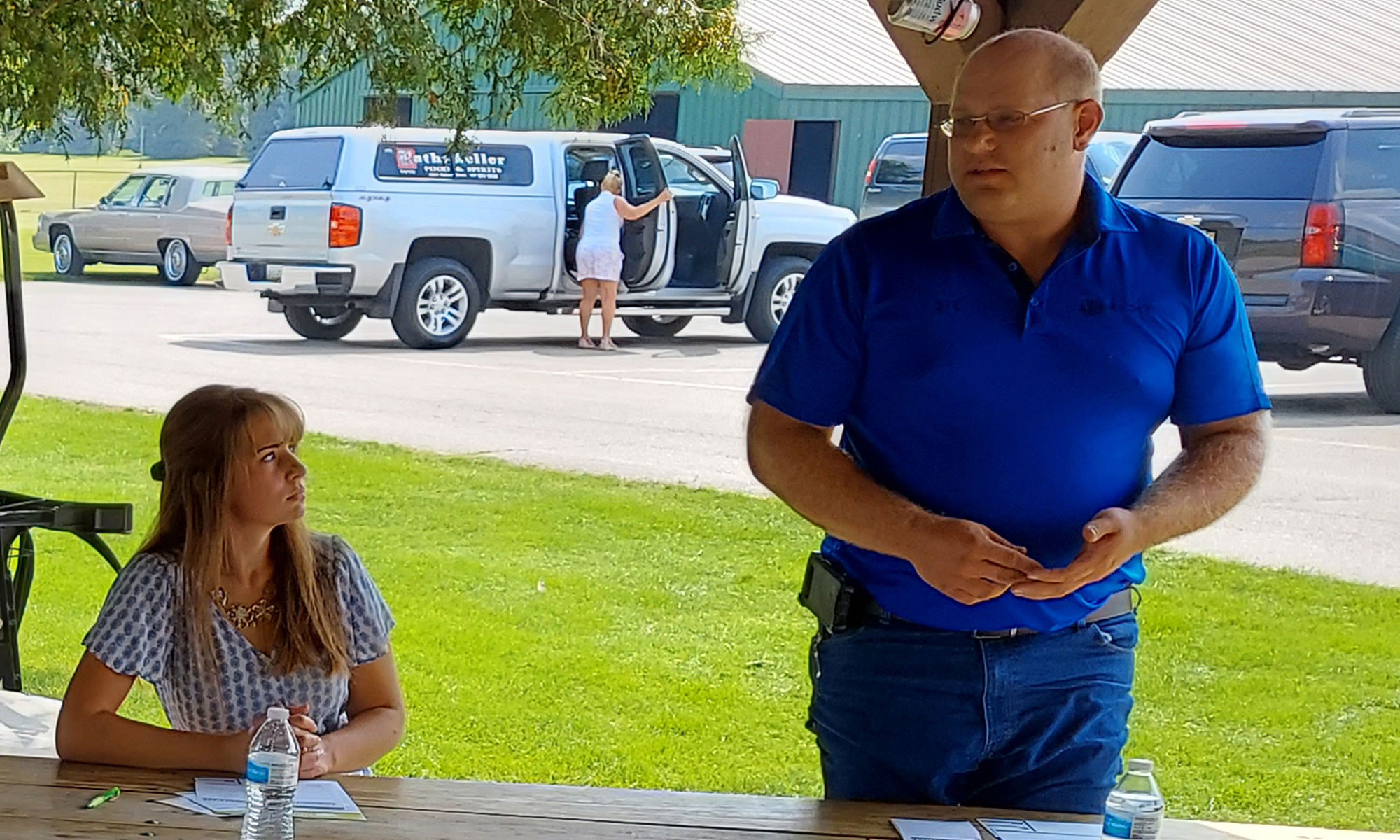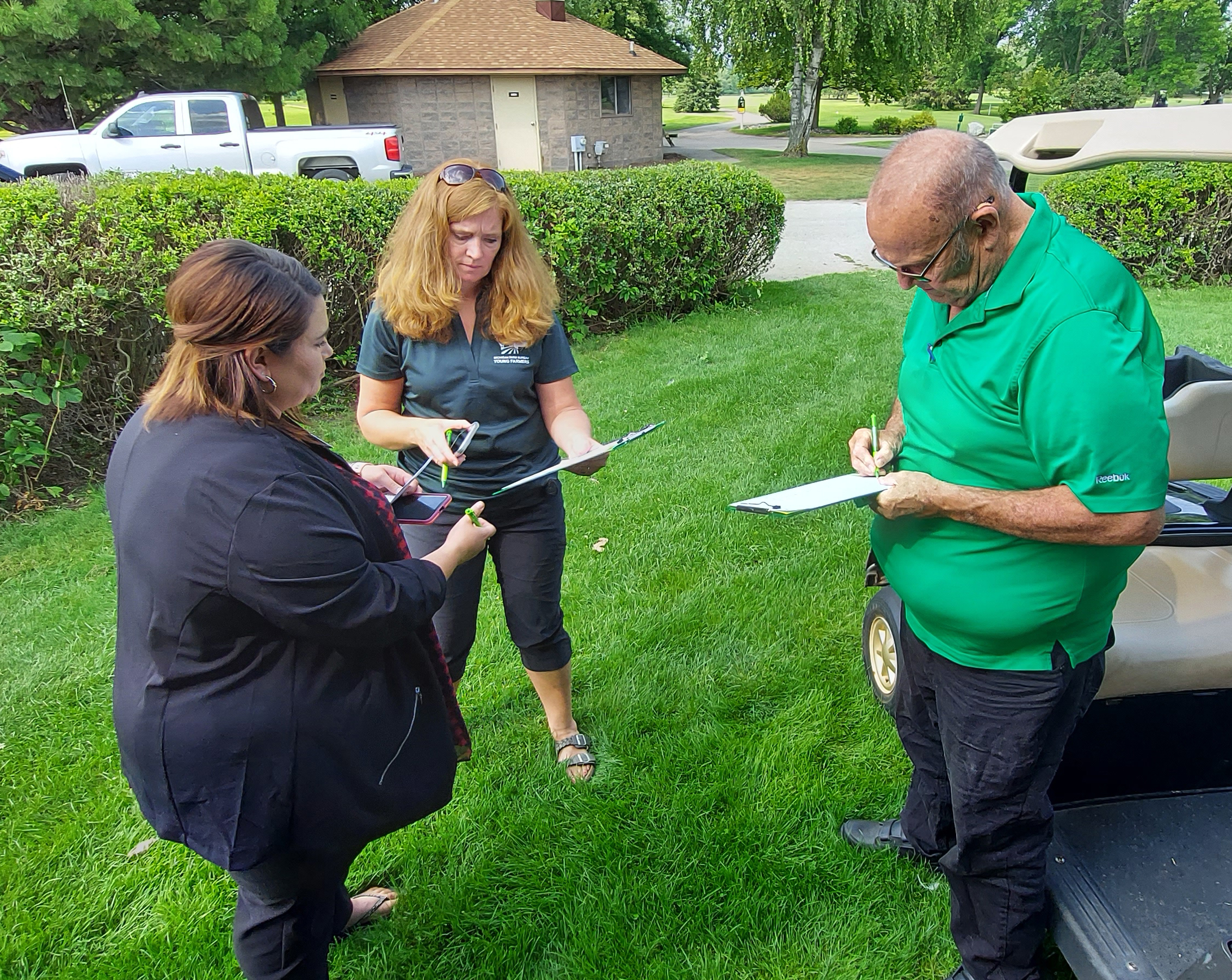A breeze-blessed picnic shelter Aug. 5, District 6’s Discussion Meet saw four articulate Young Farmers from across the Thumb engaged in an earnest conversation about how Farm Bureau and its members can step up their safety game.
Facing off from behind bold-lettered name placards were:
- Natalie Holbrook has ties to three counties, with a Farm Bureau membership in Lapeer, her work as an ag educator in Sanilac, and home roots in a Washtenaw County dairy.
- Andy Kirsch is about to age out of the Young Farmer program, saying “I guess this is my swan song!” He raises dry beans, sugar beets and hay outside Harbor Beach in eastern Huron County.
- Kelly Ratajczak’s family raises dry beans and grains near Munger. She chairs the Promotion & Education program for the Tuscola County Farm Bureau.
- Cody Tyrrell is a member of the Huron County Farm Bureau and raises heifers near Ubly.

Emcee Jade Edwards, who represents District 6 on Michigan Farm Bureau’s state-level Young Farmer committee, laid out the ground rules and introduced a discussion topic worth a good chew: How can Young Farmers help work toward a preventative, not reactive, approach to farm safety?
Holbrook got the ball rolling with the sound observation that many farm accidents and injuries happen as a result of carelessness while rushing to finish a job.
Ratajczak promptly jumped in, adding that while farmers on the whole are “relatively safe people,” impatience to complete a task is inevitable at the end of a long day: “Sometimes we just really need to take a step back and slow down.”
Making the most of his swan song, Kirsch said the evolution and overall growth of farm equipment over time has contributed to both the number and the severity of farming accidents.
To that point Tyrrell chimed in, adding that the severity and often gruesome nature of farm accidents amplifies the attention they get in the media and the public eye.
“They stick out more in our industry because we’re only 1-2% of the population,” he said, while accidents in more densely-peopled industries like manufacturing are just as routine but attract far less attention.
From there the quartet shifted their focus to Farm Bureau’s role and a conversation about improving safety training.
Kirsch and Ratajczak mentioned the importance of equipment maintenance and operational training, then went on to suggest Farm Bureau provide more information about liability. Both also agreed increased emphasis on “training the trainer” — so farmer members are better equipped to pass along best practices to farm employees — would help ensure cautionary guidance reaches all the necessary ears.
In another gear change, Holbrook brought up a safety facet unique to agriculture.
“We see a lot of incidents where youth are at risk,” she said. “It’s another area where agriculture is different from other industries.”
The routine involvement of young people on family farms, Holbrook said, means training specifically targeting youth is an essential component of a well-rounded approach to on-farm safety training.
Means for best spreading the word dominated the remainder of the conversation, with all four contestants agreeing that safety awareness content deserved prominent placement throughout Farm Bureau’s arsenal of communications vehicles, both electronic and in print.
Ratajczak reminded everyone that radio also remains an important medium for sharing practical information; Holbrook suggested better use of social media channels; and Kirsch pointed to the necessity of old-fashioned — but highly effective — word-of-mouth communication among peers all facing the same challenges.
“Farmers are a tight-knit group,” Tyrrell added. “We talk to each other all the time.”
But it was Kirsch who contributed the last word, and he made it memorable: “Educate the young, learn from the old — we all know a lot of people who aren’t here today.
“Keep on keepin’ on without getting killed.”
~
Judging the contest was longtime Tuscola County Farm Bureau member Myron Ortner and Jessica Carter from Michigan Sugar Company.
When their score sheets were tallied, it was Holbrook, Kirsch and Ratajczak getting the nod to advance to the virtual semifinal rounds to take place Nov. 12. Those advancing to the Sweet Sixteen will participate in two in-person rounds at this year’s MFB State Annual Meeting, scheduled for Nov. 30 in Grand Rapids.


